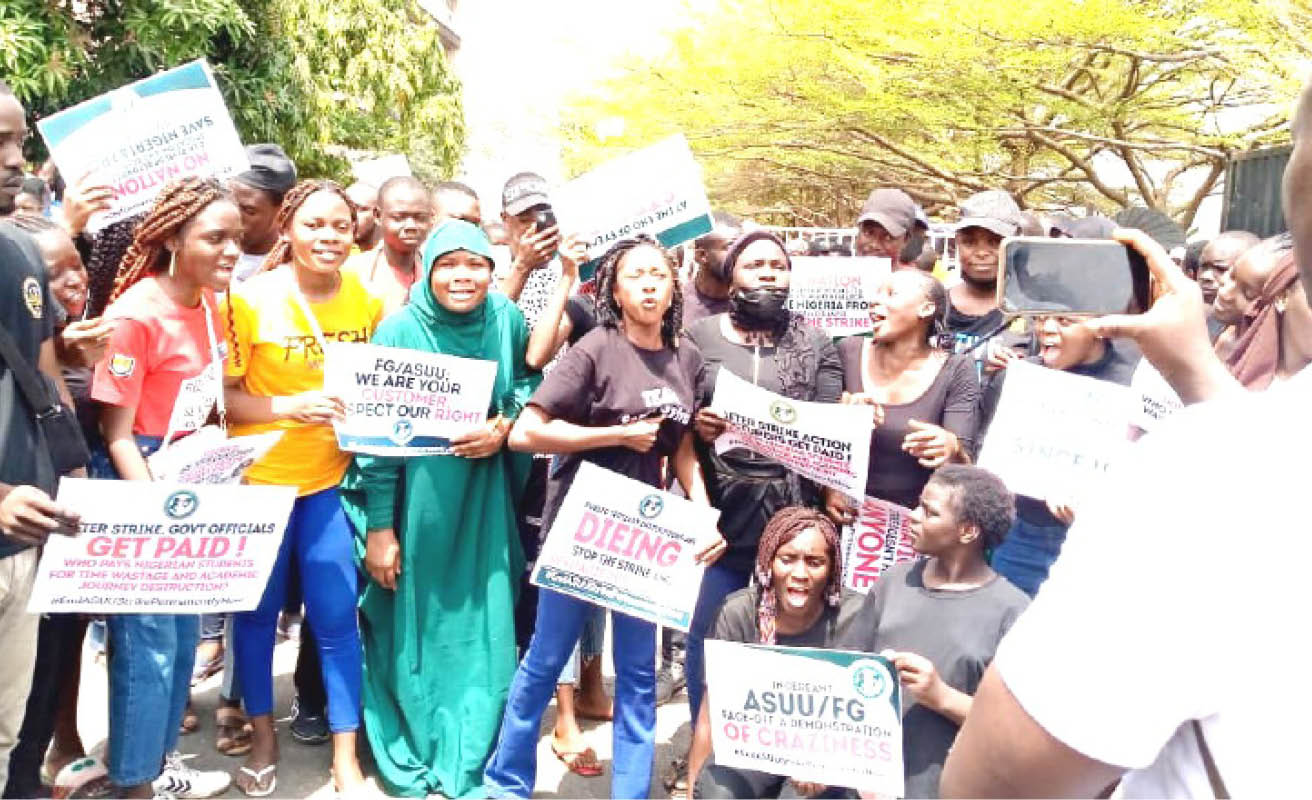Students’ Loan Act discriminates against persons with disabilities
In The recent enactment of the Student Loan Act 2023 although commendable in its attempt at improving access to higher education, has unfortunately failed to adequately address the needs of students with disabilities who form part of the most vulnerable and underprivileged in society. The living expenses or other fees that students with disabilities will […]

Nigerian students protest over ASUU strike
In The recent enactment of the Student Loan Act 2023 although commendable in its attempt at improving access to higher education, has unfortunately failed to adequately address the needs of students with disabilities who form part of the most vulnerable and underprivileged in society.
The living expenses or other fees that students with disabilities will incur, which are more expensive than the tuition covered by the act, were virtually ignored in Section 3. The act expressly excludes accommodation, feeding, and the purchase of learning materials, which students with disabilities need to fully participate in academic activities. This falls short of giving students with disabilities equitable opportunities, continuing the unintended exclusion cycle, and impeding their academic goals.
If the government were serious about enshrining disability inclusion in the country, one may have assumed that acts like this would be responsive to the needs and peculiarities of students with disabilities from the start point of application to approval.
Without specialised learning materials, assistive technology, and skilled staff, students with disabilities will face significant barriers to accessing fair educational opportunities. These services were not included under the scope of the act.
Foundation educates female students on menstrual hygiene, distributes pads
9 days after, police yet to arrest ‘killers’ of Sokoto butcher
Let’s pretend it was an oversight. Such errors could be disregarded if significant efforts have been put into implementing and operationalizing existing laws and policies. For instance, if effectively implemented, the Discrimination Against Persons with Disabilities (Prohibition) Act, 2018, would address some of the flaws in this new act as it affects persons with disabilities, particularly in inclusive education in our academic system. Unfortunately, the disability act’s implementation has been left for the dead, leaving the new act open to criticism and disability inclusion agitations.
Section 22 of the act provides that beneficiaries of the loan shall commence repayment two years after completion of the National Youth Service Corps (NYSC) programme, and sub-section 5 states that “Anyone in default of the provisions of sub-section 4 above or found to be aiding the default of any of the provisions of this act is guilty of an offence and if convicted shall be liable to imprisonment for two years or a fine of N500,000 (five hundred thousand naira) or both”. The question however is, what happens to students with disabilities who are unable to secure a paid job or lack the fund to set up a business two years after completing their NYSC programme? This question is especially critical, given the existing discriminatory recruitment practice in both public and private sectors.
It is due to the prevalence of this employment discrimination against persons with disabilities in Nigeria that the Discrimination Against Persons with Disabilities (Prohibition) Act, 2018 in Section 29, mandates that all employers of labour hire at least five per cent of PWDs. Again, this comes to the matter of implementation and effectiveness.
It is also important to state that the student loan application process and conditions are not inclusive of persons with disabilities. Section (18) clearly demands that applicants must provide at least two guarantors, each of the guarantors must be a civil servant of not less than GL12 years in the service or a lawyer with at least 10 years post-call experience, a judicial officer, and a justice of peace. Why did the act out rightly ignore the fact that societal bias adversely affects the social networks and relationships of persons with disabilities? Individuals may be unwilling to act as guarantors for students with disabilities due to concerns about associating themselves with persons who face societal prejudices.
To address potential challenges faced by students with disabilities in securing employment after graduation, the student loan act should offer flexible repayment options. This may include income-based repayment plans that adjust loan repayments according to the student’s income level. Additionally, provisions for loan forgiveness or extended grace periods can be implemented for students who face significant employment challenges due to their disabilities.
The student loan act should provide provisions for awareness campaigns and sensitization initiatives in the interest of fostering an inclusive society. These programmes may contribute to a greater understanding of the rights, requirements, and skills of students with disabilities. It may encourage acceptance and understanding among academics, fight stigma, and build an inclusive mentality.
Adapting the student loan act in Nigeria to suit the peculiarities of students with disabilities is an essential step toward creating an inclusive higher education system. Such adjustments will not only benefit students with disabilities but also contribute to a more equitable, progressive, and inclusive society.
Lynn Agwuncha is a Senior Communications Officer with TAF Africa
